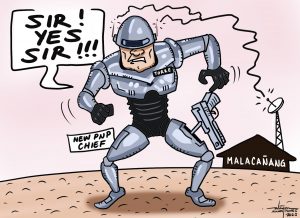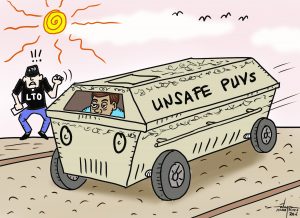Indeed in the Philippines there is this unusual characteristic of most of us when dealing with issues extremely relevant to society. We cling too much to the notion that since we are a democracy we are free to do whatever we want because freedom is guaranteed in our Constitution. We are free to express our opinion for or against policies of government even to the point of hailing it to court to question the legality of its actions.
When there is breakdown in law and order brought about by certain criminal activities of a few we blame government for not doing enough instead of strongly condemning the malefactors. If government takes aggressive moves that results to injuries or even deaths of suspected criminals still we chastise government for curtailing or depriving them of their human rights.
Let us take the case of the Philippine situation as far as the proliferation of illegal and prohibited drugs. It is common knowledge that only two or three decades ago the Philippines was well on its way to becoming a Narco state. Drug lords including some politicians and high ranking law enforcers, private citizens camouflaging as businessmen and ensconced in their posh offices, were virtually controlling society. Their subalterns down to the smallest drug pushers in the community were loading billions of pesos to the bank accounts of the drug lords.
Yet no one from those among us advocating for respect of human rights tried to take head-on the drug syndicates even if we know who they are and where they are holed up. Instead, we harangue the government for its perceived ineptitude.
But when government under then President Rodrigo R. Duterte took up the challenge and launched a nationwide stringent campaign against the illegal drug trade in the country, the human rights advocates among us lumped all deaths and injuries as casualties in the government;s drive against illegal drugs. Their human rights were violated, according to the advocates. But the rights of their victims to a peaceful and livable society free of destructive substances while they (drug traders) were on the rampage plying their socially-destructive trade, were not highlighted as violation of their human rights. Instead many of the advocates call the drug trade victims “dredges” of society.
And so much is the desire of human rights advocates to take down those who strongly addressed the serious drug problem of the Philippines that they have gone to as far as seeking the support of the International Criminal Court (ICC). They call the deaths of drug trade suspects as “crime against humanity” and not just an offshoot of a campaign against criminality. This they do to make sure that it will meet the criteria of the ICC to look into the case.
Apparently the advocates appear to be succeeding. The ICC has bitten the gambit. Now there are reports that some ICC investigators are already in the country incognito doing their surreptitious probe.
Assuming that the ICC investigators’ presence in the country is true,should the government just set by and wait? Is the government not obligated to track down the probers considering that they seemingly bypass authorities proving their lack of courtesy to an independent country?
We are therefore not surprised at the vehemence of the reaction of the former President who, without doubt, felt betrayed by some of his countrymen who believe that his (the former President’s) drive to rid Philippine society of the destructive drugs trade is instead a “crime against humanity”
Well, this is probably the reason why known leaders of criminal syndicates, drug rings, kidnap for ransom groups, land grabbers, top “rapists” of the country’s natural resources are getting elected to positions like that of mayor, governor, congressman, senators and others.
-30-


